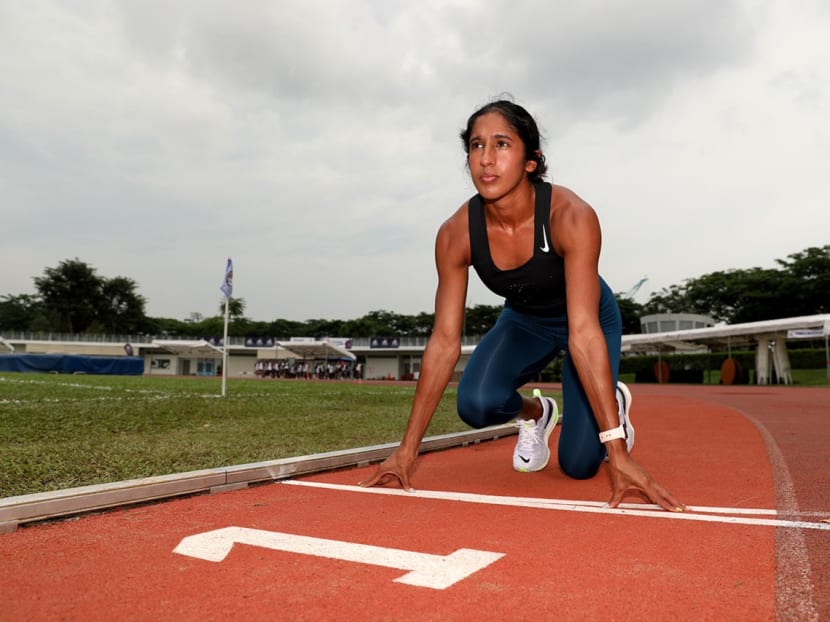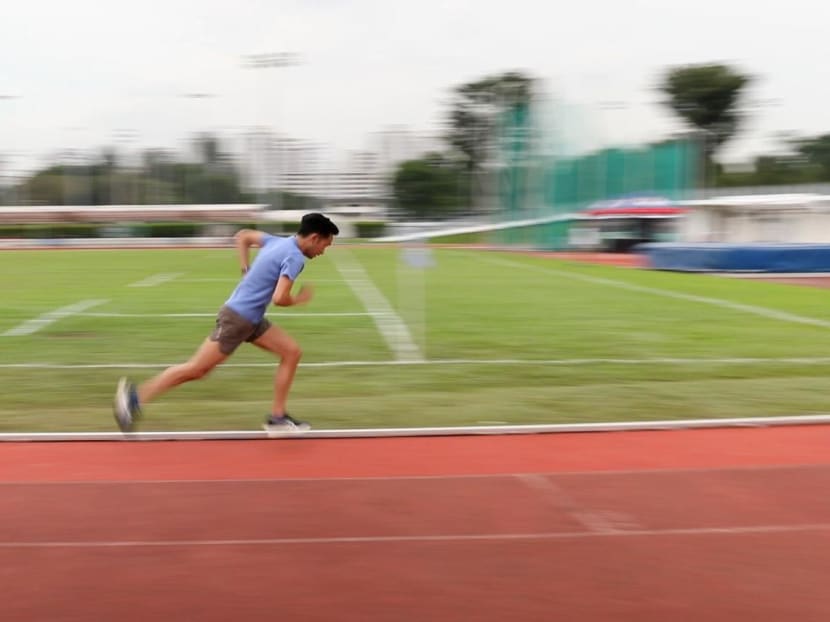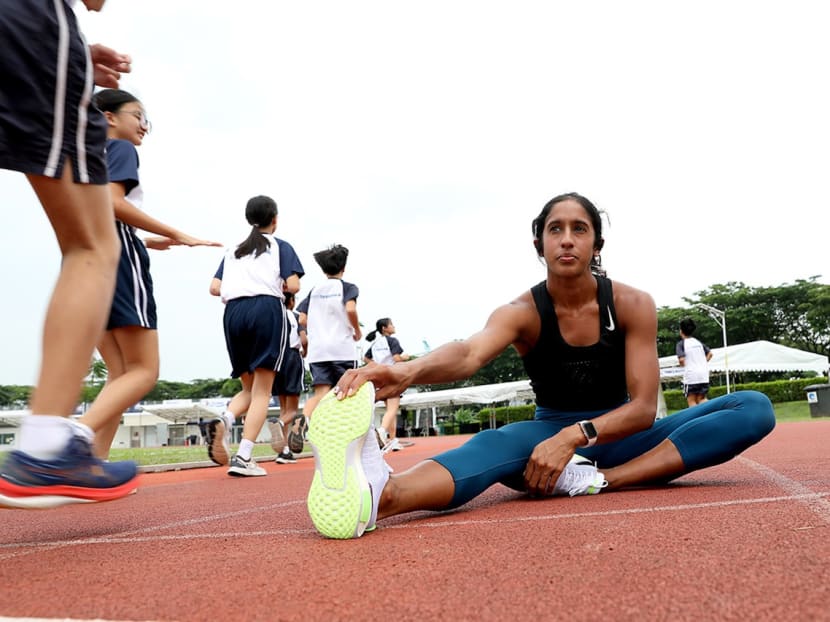Just how fast is record-breaking national sprinter Shanti Pereira? TODAY reporter takes to the track to find out
SINGAPORE — While preparing for an interview with national sprinter Shanti Pereira, I was told initially it was possible that I could have a short race with her just to illustrate how fast she is.

National sprinter Shanti Pereira said during an interview with TODAY that her loved ones keep her going and "are the reason I am here today".
- National sprinter Shanti Pereira, 26, broke her own national record three times in as many days at the Australian Track and Field Open in Brisbane over the past weekend
- Taking to the track, this journalist discovers just how fast her record-breaking 22.89s 200m national record is
- In an interview, she said accepting personal sacrifices and changing her attitude to failure were key factors in her success
- She also spoke about the challenges she has faced including a seven year gap between gold medals
- Ultimately, she says that her family is what keeps her grounded
SINGAPORE — While preparing for an interview with national sprinter Shanti Pereira, I was told initially it was possible that I could have a short race with her just to illustrate how fast she is.
Excited, I turned up at the venue in my running attire. While I’m not much of a sprinter, I still do my fair share of running over longer distances, and so was thrilled at the prospect of testing myself against the nation’s best.
After all, it had been just a few days since Pereira, 26, had broken her own national record three times in as many days at the Australian Track and Field Open in Brisbane last weekend — twice in the 100m and once in the 200m.
However, the headline race was not meant to be, as I found out closer to the interview that she would be “taking it chill” over the course of the week to recover, and would be doing lighter training that did not involve sprinting.
Not that it mattered — she had nothing to prove after her remarkable efforts down under, with the national records now standing at 22.89s for 200m and 11.37s for the 100m, down from the previous marks of 23.16s and 11.38s respectively.
In her first face-to-face interview since her record breaking endeavours, Pereira spoke about the challenges she had overcome, her ups and downs, and the benefits of being able to leave full-time work to focus on her sport.
But it was her response to a remark I made which caught me by surprise.
I had said that as with every record-breaking performance, there will be trolls online, especially men, who will make claims such as how they think that they can run as fast or as well as her.
She responded: “I don’t really have anything to say about it, I’m sure it’s just good fun, and it doesn’t really matter.
“I’ll never know; there might be men or even girls who are super fast.”
While I am far from being “super fast”, her decidedly humble response piqued my curiosity, and since I was already in my running attire, I sought to find out just how fast I could run 200m after my interview with her.
To be sure, I knew that there was no chance that I would post a time faster than hers.
And although I do have some running background and had been part of my school track team before, the shortest distance I had competed in was the 800m, and the last time I did an all out sprint was probably back during a secondary school sports day, which was half a lifetime ago.
Still, I held out some small hope that I would run a timing closer to hers than might be expected.
PITTING MYSELF AGAINST PEREIRA’S NATIONAL RECORD
I gave the 200m my best shot, running as hard as I could until my legs were wobbly and my form almost fell apart.
Crossing the finish line, I was exhausted, and could hardly speak. My timing? 30.04s. “Just” over seven seconds slower than Pereira’s record breaking 22.89s feat.

While my timing was probably better than what the average 29-year-old male can conjure, what it meant was this: By the time Pereira had completed her record breaking 200m run, I would still be 50 metres from the finish line.
In sprinting terms, it was an eternity.
The first thought that crossed my mind when I caught my breath was this: There is no way a normal person can even think of achieving what she had.
So, how did Pereira do it during her record-breaking weekend? As someone who is trying to keep fit by exercising regularly, I was hoping that there would be some lessons I could learn.
SACRIFICES MADE, AND A CHANGE IN PERSPECTIVE
Pereira is no rookie in the sport, having represented the national team for about 10 years.
Her breakthrough came early, when she attained Singapore’s first sprinting gold medal in 42 years in the 200m at the 2015 Southeast Asian (SEA) Games held here.
She won her second SEA Games gold in the same event last year in Hanoi, Vietnam, before her record breaking run last weekend.
Over the course of the past decade, making sacrifices has been part and parcel of the path to victory, she said.
“It’s just the small things, like not being able to spend time with your family and your friends, and having to say no to staying out late because you have to get some rest for a (training) session the next day,” she said.
“It’s just the small things, like not being able to spend time with your family and your friends, and having to say no to staying out late because you have to get some rest for a (training) session the next day.National sprinter Shanti Pereira on the sacrifices she makes for her sport”
At the start of her career, these sacrifices bothered her, she said. For instance, she would be “affected” when she saw her friends binge eating fast food, when this was out of the question for her.
“But now, I have come to understand what it takes to do what I do,” she said.
I reminded her cheekily that most of her friends most likely do not have any national records to their name.
“I’ll tell them that later,” she said with a laugh.
She added that over the course of her career, she had also faced ups and downs. For instance, after her maiden gold medal at the SEA Games, she was unable to repeat her feat for seven years, which led to bouts of self doubt and negativity during that period.
“I was just in a very negative space, and it had an effect on me,” she said.
“After a while, I realised that, you know what, it all doesn’t matter, what matters is what I’m doing and I’m the only one who has the power to control where my journey goes.”
LEAVING HER FULL TIME JOB
One key factor contributing to her recent stellar form was her conversion into a full-time athlete in January this year.
Pereira, who had previously held a job at a creative agency as a copywriter, left her role as she took on a Sport Excellence Scholarship, which allows her to train full-time, exposing her to more major competitions overseas, while drawing an allowance, among other benefits.
“When I was working and training at the same time, it was a bit difficult to find time for recovery, and it was hard to maintain a certain level of quality for all of my sessions, as there are some days where I just can’t help it (as) I’m tired,” she said.

The scholarship has given her the chance to focus not just on training, but how she spends her time outside of training, she said.
“Being an athlete is 24/7, 365 (days of the year), so there are a lot of things that come into play outside of the actual training sessions — how I’m mentally preparing for it… my food, my sleep, how I recover,” she said.
She added that with the SEA Games in Cambodia next month, her immediate goals remain the same despite her new records: To defend her 200m gold, as well as clinch gold in the 100m as well.
WHAT MAKES IT ALL WORTH IT
She added that at the end of the day, what keeps her going is not the bright lights and the fame, nor is it necessarily the medals around her neck. It is something simpler than that.
In the days after her national records, she came home to a pleasant sight — a vase of flowers with the numbers “11.37” and “22.89” on it, as well as two pink balloons with the same numbers printed on them, representing her respective national records.
The vase was put together by her mother, a teacher, while her boyfriend, national sprinter Tan Zong Yang, who is also a lawyer, printed the balloons.
“My whole support system was so happy, and I think they were just as shocked as me and my coach,” she said.
“They are the reason I am here today.”
While her career path is vastly different from that of the everyday man, my conversation with her had me thinking about how the pursuit of greatness is a universal desire, whether in a 200m sprint, in our careers, or even in our personal lives.
Whether it is about putting in the extra hours to be a top performer at work, or pushing yourself off the couch to exercise and keep fit, success involves making difficult sacrifices and, crucially, accepting that trade-off, just as Pereira has.
Most importantly, we need to always keep in our hearts those waiting for us at the finish line.








